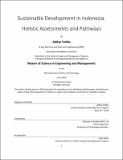| dc.contributor.advisor | Nicholas A. Ashford. | en_US |
| dc.contributor.author | Yodha, Aditya | en_US |
| dc.contributor.other | Massachusetts Institute of Technology. Integrated Design and Management Program. | en_US |
| dc.coverage.spatial | a-io--- | en_US |
| dc.date.accessioned | 2018-10-19T13:40:31Z | |
| dc.date.available | 2018-10-19T13:40:31Z | |
| dc.date.copyright | 2018 | en_US |
| dc.date.issued | 2018 | en_US |
| dc.identifier.uri | http://hdl.handle.net/1721.1/118620 | |
| dc.description | Thesis: S.M. in Engineering and Management, Massachusetts Institute of Technology, System Design and Management Program, 2018. | en_US |
| dc.description | This electronic version was submitted by the student author. The certified thesis is available in the Institute Archives and Special Collections. | en_US |
| dc.description | Cataloged from student-submitted PDF version of thesis. | en_US |
| dc.description | Includes bibliographical references (pages 57-69). | en_US |
| dc.description.abstract | This thesis assesses the status of sustainable development in Indonesia, identifies the systemic barriers, and offers holistic development pathways toward sustainability. The framework employed in this research looks at the interactions between the economy, employment, and environment while taking into account the forces of technology and globalization. It concludes that the development in Indonesia is not yet on a sustainable path. The economy is performing well and unemployment is low, but inequality is very high, capacity to adapt is low, and the environment is quickly degrading. The major barrier towards sustainability are fundamentally politics: messy decentralization, pervasive corruption, and persistent elite capture. Other systemic barriers are the low level of education, fragmented innovation system, and low awareness of sustainability issues. To make progress towards sustainability, the systemic barriers must be cleared. Local governments need to be made clean and competent; lifelong learning systems established; local innovations boosted; pollutions prevented at the source using technological or organizational innovations; and awareness of sustainability issues raised. The findings in this thesis are summarized and mapped to the UN Sustainable Development Goals in the concluding chapter. | en_US |
| dc.description.statementofresponsibility | by Aditya Yodha. | en_US |
| dc.format.extent | 73 pages | en_US |
| dc.language.iso | eng | en_US |
| dc.publisher | Massachusetts Institute of Technology | en_US |
| dc.rights | MIT theses are protected by copyright. They may be viewed, downloaded, or printed from this source but further reproduction or distribution in any format is prohibited without written permission. | en_US |
| dc.rights.uri | http://dspace.mit.edu/handle/1721.1/7582 | en_US |
| dc.subject | Engineering and Management Program. | en_US |
| dc.subject | Integrated Design and Management Program. | en_US |
| dc.title | Sustainable development in Indonesia : holistic assessments and pathways | en_US |
| dc.type | Thesis | en_US |
| dc.description.degree | S.M. in Engineering and Management | en_US |
| dc.contributor.department | Massachusetts Institute of Technology. Engineering and Management Program | en_US |
| dc.contributor.department | Massachusetts Institute of Technology. Integrated Design and Management Program. | en_US |
| dc.identifier.oclc | 1055656997 | en_US |
